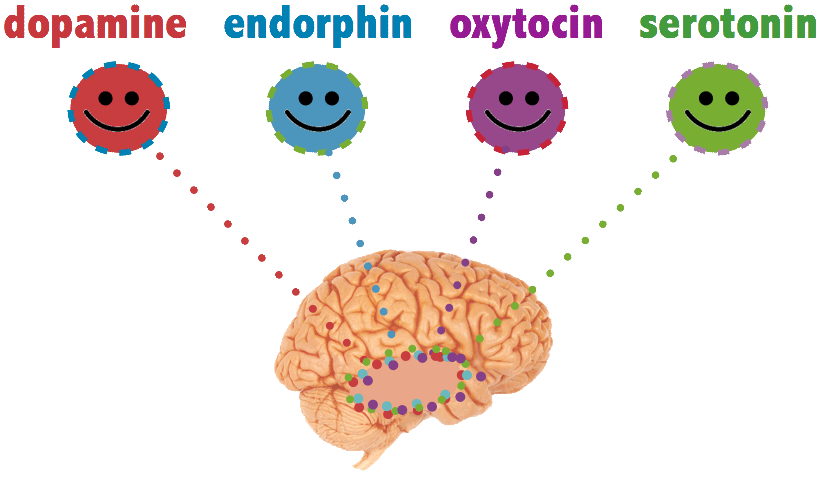It used to be thought that oxytocin only helped us experience feelings of affection, empathy, and trust. A lot of advice about marital well-being was based on its impact.
In October 2020, new research results were published on the effect of oxytocin on our mood, relationships with a partner, friends and colleagues. American scientists have found that, among other things, it can provoke suspicion, avoidance of contacts and envy.
The article was checked and commented by Nargis Jamolova, an obstetrician-gynecologist, candidate of medical sciences.
What exactly is known about oxytocin?
The “hug hormone” primarily performs clear physiological functions. Its main task is to promote procreation. Oxytocin is produced in humans and animals, but its potency can vary depending on genetics. Oxford University studies have shown that the substance is released into the blood during orgasm in both men and women. In the first case, the hormone promotes the rapid movement of spermatozoa. In the second, it stimulates muscle contractions, helping male sex hormones reach their ultimate goal, the egg.
Nine months later, oxytocin triggers contractions. In particular, it stimulates uterine contractions. That is why doctors can inject it to a woman during childbirth. For the same reason, an increased level of the hormone is dangerous in the early stages of pregnancy. In the future, oxytocin plays an important role in the process of lactation, and also helps to establish a psychological bond between mother and child. One way or another, the hormone is really associated with processes that cause pleasant emotions.
The effect of oxytocin on physical health
Studies over the past ten years show that the presence of oxytocin in the blood can positively affect human health. Biologists from Ohio University believe that the hormone contributes to the rapid healing of wounds. The experiment involved 37 couples. With their consent, the scientists made small incisions in the skin of these people. During the entire time the scratches were healing, the doctors measured the level of oxytocin in the blood plasma. At the same time, the lovers maintained their usual relationship: they hugged, kissed, quarreled. It turned out that the speed with which the subjects recovered depended on the amount of the hormone in the body. Indirectly, these data confirm the fact that positive contacts with loved ones can directly affect health.
An unexpected experiment, which was performed on rats by doctors from the University of Pennsylvania, also speaks of the benefits of oxytocin. Scientists suggest that the hormone helps to better digest food. It is known that stress negatively affects the digestive tract. In particular, strong emotional stress can contribute to food retention in the stomach. This effect can lead not only to bloating, discomfort, nausea and diarrhea, but also to more serious problems, including ulcers.
In contrast to stress, the researchers decided to use oxytocin as a stimulant for the digestive tract. They injected different doses of the substance into the brains of rats and monitored the reaction of the rodents. As a result, biologists came to the conclusion that the hormone activates the contraction of the muscles of the stomach, which leads to the speedy digestion of food.
However, it is still too early to treat a sick stomach with hugs. Still, the body of rodents is different from human’s. However, in the future, scientists plan to continue experiments that may help develop new therapies for stomach diseases.
Is the ”cuddle hormone” a myth?
As for hugs, according to research from Harvard Medical School, the greatest release of the hormone occurs in the body immediately before physical contact. Scientists suggest that the stimulus is directly the emotions of expecting something good, and not specific touches.
In other words, cuddling really helps to reduce stress and increase attachment when you and your partner have a warm relationship. But during the period of quarrels and insults, oxytocin is unlikely to help.
Until recently, it was believed that the hormone ensures the establishment of social bonds, helps us to trust each other more, and is also able to maintain monogamy in marriage. However, recent data show that not everything is so simple.
Many conclusions about the properties of oxytocin have been made on the basis of experiments with mice. These rodents are faithful to their partners all their lives and are able to show empathy for each other. In particular, during times of stress, the animals try to calm their loved ones. As soon as scientists blocked oxytocin, laboratory animals immediately lost interest in their partner.
Trials of the monogamy hormone theory in humans showed similar results.
For example, an article published in 2012 in the magazine Natural Science tells that married men who were injected with oxytocin using a nasal spray tried to maintain an emotional distance from unfamiliar attractive women, in contrast to those who received a placebo.
However, new data appeared already in 2018. It turned out that the hormone that entered the body through the nose did not always reach the brain and influenced such decisions.
According to other studies, the substance caused opposite emotions in representatives of different sexes. If in men it awakened egoism and the desire for rivalry. In women, on the contrary, empathy and altruism.
Recent studies prove that the hormone is, first of all, a regulator that maintains the stable functioning of the body.
The effect of oxytocin on psychological health
Most of the hormone is produced in the hypothalamus, the part of the brain that regulates the endocrine system. All the positive feelings associated with it appear here.
However, another part of the brain also produces oxytocin – the supporting nucleus of the marginal strip. This compartment is not yet fully understood, but there are suggestions that it is there that anxiety disorders, depression, and addictions are formed. The reasons for the appearance of oxytocin in this part of the brain were unknown until recently. Experiments on mice have shown that it is in the support nucleus that oxytocin provokes anxiety, as well as envy. Here it is produced in connection with prolonged stress. At the same time, fleeting emotional outbursts did not affect the release of oxytocin.
Responses to the hormone, as in the case of the hypothalamus, were more active in females. Thus, it is likely that new research will shed light on the study and treatment of anxiety disorders, which are more common in women.
Expert comment
Nargis Jamolova,
obstetrician-gynecologist, candidate of medical sciences, doctor of ultrasound diagnostics
Oxytocin is a sex group hormone that is predominantly produced in the female body. However, in a small amount, it is also synthesized in men in the hypothalamus. Like any other hormone, it works in tandem with receptors. This means that if there are few receptors for oxytocin on the cells, then no matter how much it is in the body, the effect will be small. Receptors, like any other proteins, are encoded in genes.
Long-term studies have shown that the activity of oxytocin receptor genes in children depends on maternal care. This factor helps to form the oxytocin system, on which, in turn, the adequate socialization of the child depends. Maternal depression, stress, and fatigue interfere with the synthesis of this hormone, which can cause muscle contraction and make it difficult for the baby to drink milk.
Oxytocin also regulates the production of the male sex hormone testosterone and promotes its transformation into its active form – dihydrotestosterone. It also reduces the synthesis of cortisol (“stress hormone”) and adrenocorticotropic hormone, which trigger destructive processes in the muscles. That is why it is important to monitor the balance of hormones in the body. Excess oxytocin negatively affects the work of the adrenal glands, which produce cortisol, so if it is not produced enough, a breakdown can occur. The fact is that this hormone is vital. It helps us respond to danger and deal with it. Thanks to cortisol, a person concentrates better, thinks faster, and glucose, which is necessary for muscle work, enters the bloodstream.
Excess oxytocin also inhibits the release of testosterone in the body. At the same time, a man’s libido decreases, the level of natural sex hormones and the functionality of the prostate gland normalize.
Why is oxytocin prescribed to men?
Oxytocin has the following effects on the male nervous system:
- eliminates stress factors;
- decreases sexual desire;
- improves emotional susceptibility.
Studies on the results of oxytocin therapy have also shown the effectiveness of this hormone in relieving painful symptoms in menopausal women, with headaches, and in improving mood when dealing with depression.










